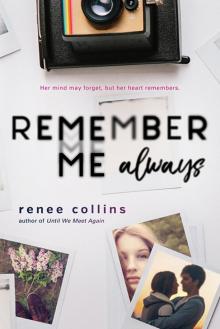- Home
- Renee Collins
Remember Me Always
Remember Me Always Read online
Also by Renee Collins
Until We Meet Again
Thank you for purchasing this eBook.
At Sourcebooks we believe one thing:
BOOKS CHANGE LIVES.
We would love to invite you to receive exclusive rewards. Sign up now for VIP savings, bonus content, early access to new ideas we're developing, and sneak peeks at our hottest titles!
Happy reading!
SIGN UP NOW!
Copyright © 2017 by Renee Collins
Cover and internal design © 2017 by Sourcebooks, Inc.
Cover design by Nicole Hower/Sourcebooks, Inc.
Cover images © kkgas/Stocksy; Aleshyn_Andrei/Shutterstock; karelnoppe/Shutterstock
Sourcebooks and the colophon are registered trademarks of Sourcebooks, Inc.
All rights reserved. No part of this book may be reproduced in any form or by any electronic or mechanical means including information storage and retrieval systems—except in the case of brief quotations embodied in critical articles or reviews—without permission in writing from its publisher, Sourcebooks, Inc.
The characters and events portrayed in this book are fictitious or are used fictitiously. Any similarity to real persons, living or dead, is purely coincidental and not intended by the author.
All brand names and product names used in this book are trademarks, registered trademarks, or trade names of their respective holders. Sourcebooks, Inc., is not associated with any product or vendor in this book.
Published by Sourcebooks Fire, an imprint of Sourcebooks, Inc.
P.O. Box 4410, Naperville, Illinois 60567-4410
(630) 961-3900
Fax: (630) 961-2168
www.sourcebooks.com
Library of Congress Cataloging-in-Publication data is on file with the publisher.
Contents
Front Cover
Title Page
Copyright
Chapter 1
Chapter 2
Chapter 3
Chapter 4
Chapter 5
Chapter 6
Chapter 7
Chapter 8
Chapter 9
Chapter 10
Chapter 11
Chapter 12
Chapter 13
Chapter 14
Chapter 15
Chapter 16
Chapter 17
Chapter 18
Chapter 19
Chapter 20
Chapter 21
Chapter 22
Chapter 23
Chapter 24
Chapter 25
Chapter 26
Chapter 27
Chapter 28
Chapter 29
Chapter 30
Chapter 31
Chapter 32
Chapter 33
Chapter 34
Epilogue
Acknowledgments
About the Author
A Sneak Peek at Until We Meet Again
Back Cover
For Mom and Dad, because I became a writer a little bit more every summer I spent in that motor home.
Chapter 1
They say you can’t go home again. I always found that to be an odd statement. Of course, when you’ve lived your entire life in the same house on the same street in the same small town—a town where the biggest change in recent memory was the new coffee shop opening up on Pine Street ten years ago in 2006—there seems to be no danger of the familiar slipping from your grasp.
Driving back from Denver last night, however, I wondered if everything would feel different. Spending the entire summer away—for the first time in my life—will surely mean some things have changed. And I dread the thought. It seems ironic that I spent two months in therapy, trying to forget, trying to move on, and now I just want to remember.
I want to go home again. I need it.
Sitting here in my room, sprawled out across my queen-size bed, with Grace sitting cross-legged beside me, I have my first sense that all is as I left it. My room looks exactly like it did two months ago. The same pale cream walls covered in movie posters. My TV propped on my dresser, with stacks of DVDs piled on either side of it. The familiar smell of vanilla cookies—a candle whose wax I spilled on my floor forever ago, the scent somehow still permeating the wood. Even our snacks are the same. Two large Dr Peppers and two overflowing bowls of nachos from the gas station. Red licorice. Spicy beef jerky.
“I can’t even tell you how much this summer sucked,” Grace says for the fifth time tonight. With a tortilla chip, she scoops up some extra cheese from the bottom of her nacho bowl and pops it in her mouth. “I’ve probably gained forty-five pounds,” she says between crunches.
I roll my eyes. “There you go, mistaking pounds for ounces again.”
“I’m serious!” she insists. “My jeans barely zipped this morning. I’m going to be a whale on the first day of school.”
Nothing has changed with Grace either. She has what I like to call Pretty Girl Syndrome. She’s beautiful—long blond hair, sparkling hazel-green eyes, and a fantastic figure. But when you’ve been pretty all your life, you become dependent on the attention your good looks bring you. Grace seems to live in fear of losing even a drop of that perfection. And with a new school year—our supposedly triumphant senior year—less than a week away, her anxiety has only grown.
I tell myself that’s one of the perks of being average looking. Low expectations means low stress. No one’s watching the lanky drama girl with brown eyes and brown hair. Except when I’m onstage, of course. I certainly hope they’re watching then.
“It’s all your fault,” Grace said, eating another nacho. “You shouldn’t have left.”
“It’s not like I didn’t have a good reason.”
“I know,” she sighs. “You needed to be there. But I can’t handle being alone. You know that.”
“Oh, trust me, I know.”
Her smile fades a little. She scrapes her chip in the cheese. “I did something really stupid, Shelby.”
An alarm goes off in my mind.
“Doing stupid stuff is usually my job,” I say, trying to keep the conversation upbeat. But I know that look on her face. I know it all too well.
“I was so lonely,” Grace says, her voice both defensive and distraught.
“Please don’t tell me Mike called you.”
Tears well up in her eyes. Grace has always been an easy crier, but this goes beyond that. I put my arm around her in a hug. “Come here.”
She rests her head on my shoulder with a shuddering breath.
“Tell me what happened,” I say softly.
“The same thing that always happens.”
“A week or two of dating, and then you got restless and broke up with him. And then he made you feel like a horrible person.”
Grace is quiet for a moment and then sighs. “Something like that.”
“You swore him off, Grace.”
“I know,” she says, sitting up, looking mournful. “I know.”
“When are you going to stop doing this to yourself?” She shakes her head, and I rub her back. “I hate seeing you like this. Look at what this get-back-together-break-up game does to you. I don’t get why you can’t stop.”
“You hardly have room to lecture me about this,” she scoffs. But the moment she speaks the words, she snaps her mouth closed.
“What’s that supposed to mean?” I ask.
“Nothing,” She shakes her head. “Never mind. I just meant that you…you don’t understand.”
“I don’t,” I say with a sigh. “And it hurts to see you like this.” For the hundredth time. “You deserve better.”
She nods, wiping her eyes. Deep down, I’m glad I don’t understand what she’s going through. If this is what love does to people, maybe I’m glad I’ve never been in love.
A shiver crawls down my spine, making my back straighten. I rub my arms, frowning a little.
“Besides,” I say. “I’m pretty sure Mike can get arrested for dating a minor.”
“He’s only twenty-one.”
“Well, that’s old, Grace. He needs to move on from high school. He’s not the basketball star dating the freshman on the pom squad anymore.”
I say the words, but I know it’s not quite true. As long as Mike Jasper stays in Orchardview, Colorado, he’ll always be the basketball star. Even if some of us see him for what he really is: a two-bit mechanic at the Jiffy Lube who’ll never fully let go of his high school glory days and never veers more than fifty miles away from home.
“You’re right,” Grace says. “I want to be rid of him for good.”
“You have to stick with this. Remember how this feels the next time he comes around.”
She closes her eyes, nodding with determination. “I have to. I can’t forget. I won’t forget. I’m not going to give him even one more day of my life.”
“Exactly,” I say, walking her through the conversation we’ve had many times before. “You’ve already given him too much.”
“All those years,” she says, her expression growing distant. “I can’t get them back.” She drops back on my bed and stares up at the ceiling “I wish I could erase all the crap from my life. You’re lucky, Shelby.”
Her words sting a little. “Lucky? To get in a car accident? Are you forgetting how bad the panic attacks got?”
“You know what I mean.”
I do, but the casual way she talks about my therapy unsettles me. I can see Mama’s wisdom in not telling many people about it. Most of our friends and neighbors think I spent the summer in Denver with a physical therapy specialist. Not at the neuroscience lab having my memory systematically altered. Orchardview folk either don’t understand stuff like that, or they don’t trust it. Probably both.
Grace sighs deeply. “To have a clean slate. Must be nice.” She sits up. “Maybe I’ll ask my dad to take me to Denver this weekend. Could you get me in, Shelbs?”
I smile a little. “It’s not that easy. There’s, like, a two-year waiting list. It’s still in trials.” I pat her leg. “And besides, I’m pretty sure they wouldn’t be willing to use their technology to erase a boyfriend.”
Grace gives a sharp laugh. “This is so weird,” she mutters, almost to herself.
“What’s weird?”
She meets my gaze, her expression saying more. Words that she wants to say. I know that look.
“What is it?” I ask. “What’s wrong?”
She gives a quick smile. “It was weird to have you gone this summer, that’s all. And…I’m glad you’re back.”
“Me too.” I try to act casual, but her behavior has put me on alert. Did two months of separation make things awkward between us?
Grace leans over the bed to her nightstand, where her large soda is gathering condensation. “Crap, my Dr Pepper’s getting diluted.” After taking a long sip, she shakes her cup at me accusingly. “Look at me guzzle this thing! This is what I’m talking about. I’ve fallen into all my bad habits with you gone.”
My clenched insides relax a little. “Well, I’m here now, and everything can go back to normal,” I say, hoping to convey sincerity in my voice as I attempt to keep the mood light. I grab my drink and take a sip as well. “And not a minute too soon. The Dr Pepper in Denver tasted terrible. I almost switched to Mountain Dew.”
Grace looks appalled. “How could you even think it?”
We both laugh, and the conversation shifts back to the local gossip I missed and plans to take the school by storm this year, but the unsettled feeling lingers deep down, even after I’ve dropped off Grace. Driving back to my house, I can’t shake the growing pit in my stomach. Maybe things really are different. Maybe you can’t go home again.
I scan the dark streets of Orchardview rolling past me. It’s all exactly as I left it in May. Small brick homes built in Orchardview’s heyday in the 1960s. Mature trees and dated hedgerows. Kids’ bicycles laying on trimmed front lawns. Old cars parked in driveways, collecting rust until their owners eventually make it out to putter on them. A weathered, neon-pink flyer for the town BBQ stapled to a telephone pole. It’s the perfect little American town. The only town I’ve ever known.
When did it start to feel foreign to me?
I tighten my grip on the steering wheel and shake my head firmly. No. I’m better now. Life is going to go back to normal. I’m going to go back to school in a week, a senior at last. I’m going to audition for the school play, Romeo and Juliet. Life will be exactly as it’s always been.
But the words sound hollow. I scan the streets again with an intensity that clamps around my throat. These are the same streets. The same houses. The same street lamps and the same sidewalks. Everything is the same. So what’s wrong with me?
Breathing hard, I jerk the wheel to the side and jam the car into park. I step out, slamming the door in the silence of the street. A pale-orange tabby rushes away, startled. I look around me in a slow circle, trying to calm my pulse.
Uneasiness washes over me, and it goes beyond Grace acting a little strange tonight. This feeling runs deeper. If I’m honest with myself, I’ve felt it since the morning I last sat in the sterile, white therapy room with Dr. Stevens, preparing to check out and head home. The thought has lingered with me in spite of my efforts to destroy it.
Something’s not right.
A familiar feeling surfaces inside of me. A tightness in my throat. A pulse in my temples. The early twinges of a panic attack. I can’t go through this again. Not now. I can’t go back to the way things were before.
I need to forget again.
Chapter 2
I can’t remember the accident. According to Dr. Stevens, that means his therapy is working as it should.
It’s strange, losing a piece of your memory. Like staring at an unfinished puzzle. The pieces around the periphery are there, the color and scent and emotion. But then, searching for the actual moment—nothing.
I don’t doubt that the accident happened. I have the scars to prove it. And oddly enough, I remember the panic attacks that followed. I remember the nights that I woke up screaming. Days when my hands wouldn’t stop trembling. My heart seemed to constantly race in my chest. And hanging over it all like a dark, ripe cloud is the abiding sense that something terrible had happened.
Blake, also known as Stepdad Part Two, was the one to suggest neural restructuring. Two years ago, his war hero status had gotten him into early trials, and it did wonders for his PTSD. Mama used that status to press for my inclusion. My aunt Winonna was a nurse working on the trial, so she pulled some strings and tipped the scales. I was lucky to get in.
After that night with Grace, I spent five full days trying to convince myself that I was going to be okay, but the anxiety only grew. Different than before but undeniable. It curled around my insides like the roots of a dark tree. I could keep up the facade for only so long before Mama became aware. She always knows.
She’s a contradiction, my Mama—seemingly indifferent to me most of the time yet always watching. Nothing slips past her. So when she found me in the bathroom one morning, struggling to get my breathing under control, it was back to Denver for an “emergency” checkup four days before school started.
Sitting in Dr. Stevens’s office again is, ironically, the most familiar sensation I’ve felt in a while. The walls gleam whiter than white. Muted Mozart hums from a hidden speaker in the wall. Two tast
eful paintings of the Rocky Mountains hang in perfect symmetry on either side of the wall. It smells like gauze and the slightest hint of lemon. Even Mama, flipping through a six-month-old People magazine on a chair beside me, completes the ambiance.
In the corner, the neural restructuring capsule sits, like a leftover set piece from the Borg commune in the Star Trek movies. It actually looks like an MRI machine. I’ve gotten into the capsule so many times before, I know what to expect. It doesn’t hurt. Yet every time I lie down inside of it my pulse races.
A short, plump nurse in Winnie-the-Pooh scrubs breezes into the room. Aunt Winonna.
“Well, well. Look who’s back,” she says brightly.
Winonna is Mama’s first cousin and the only one in the entire extended family to leave Orchardview for Denver. She still feels like Orchardview to me, though, with her big country bangs, pink lipstick, and the tattoo of her boyfriend’s name around her ring finger.
“Good to see you again,” Mama says, reaching out to give her a one-armed hug. “Didn’t think it’d be so soon, but Shelby’s…well, you know how she is.”
I stare at my mother. So she’s going to play the “Shelby is a drama queen” card instead of owning up to the fact that she pushed for me to come here? A flash of anger heats my throat.
“We want you to feel secure with your results,” Aunt Winonna says, tactfully maneuvering around the comment. She pulls out her stethoscope. “But I’ll leave that to Dr. Stevens. Let’s take your vitals.”
“Sounds good,” I say, sitting up straighter as she sets the cool metal against my back. I’m relieved she doesn’t make eye contact with me.
Winonna listens to my heart and lungs and scribbles some notes on her clipboard chart. She then sweeps out wordlessly.
Mama sighs and picks up her People magazine again.
My jaw sets. “Thanks for throwing me under the bus.”
Mama’s eyes flash. If there’s one thing she doesn’t tolerate, it’s sarcasm. She calls it the gateway to liberalism.
“Don’t you take that tone with me.”
It takes all of my energy not to scoff. “I only came back because you made me.”

 Relic
Relic Remember Me Always
Remember Me Always Until We Meet Again
Until We Meet Again